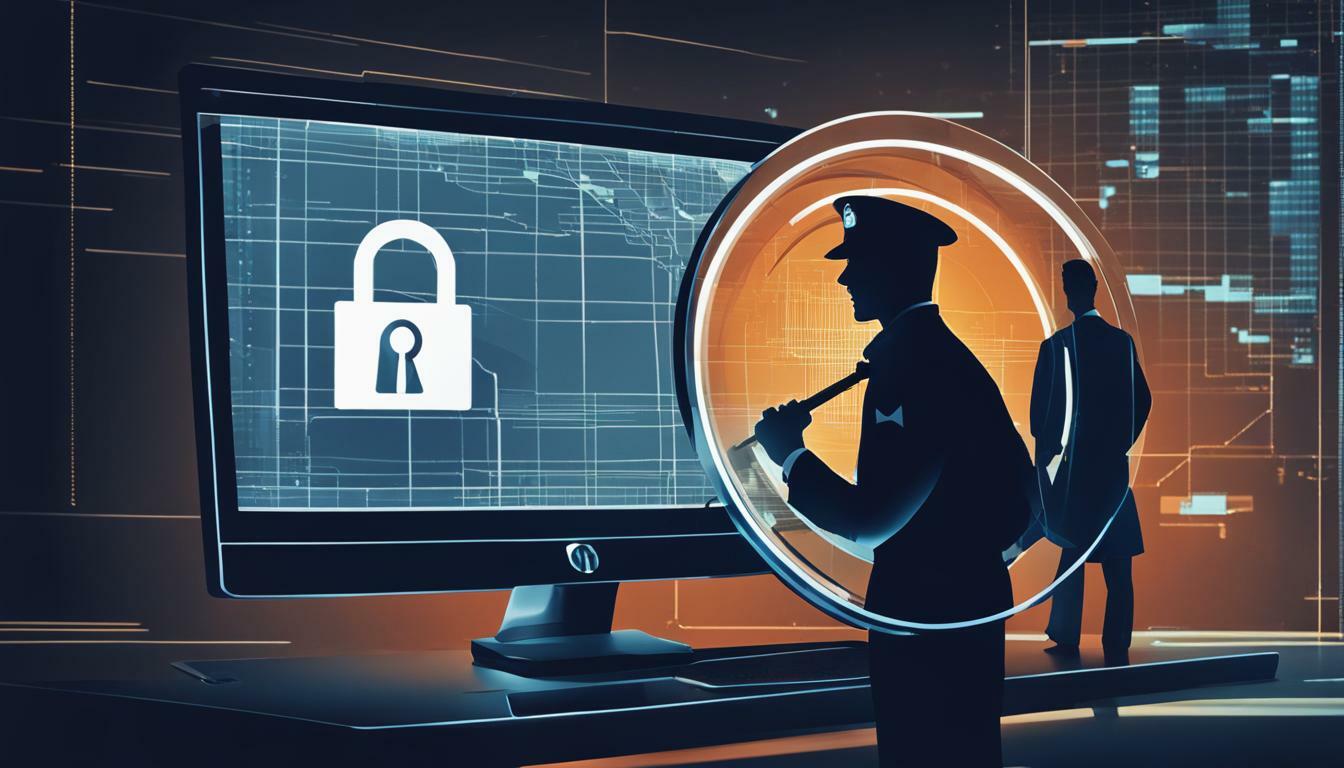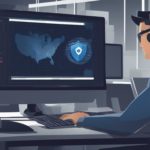Concerns about law enforcement access to data through VPNs have become increasingly prevalent in the digital age. As more individuals seek to protect their online privacy and security, understanding the intricacies of VPN security and its implications for data privacy is crucial.
Law enforcement’s ability to access data through a VPN is a complex issue. While VPNs can provide privacy and anonymity by hiding IP addresses, there are limitations to their effectiveness. Police can track VPN users and activity through various methods, and VPNs are not immune to metadata analysis.
Websites can still track user activity patterns, even when VPNs are used. Additionally, the legality of VPN usage varies by country, with some jurisdictions requiring VPNs to log user data. This highlights the importance of choosing a reliable VPN provider that prioritizes strong encryption, adheres to a no-logging policy, and offers overall robust security.
It is crucial to recognize that while VPNs can enhance privacy, no security measure can guarantee complete anonymity online. As such, VPNs should not be utilized for illegal activities.
Key Takeaways:
- Law enforcement can track VPN users and activity through various methods.
- VPNs are not impervious to metadata analysis and website tracking.
- The legality of VPN usage varies by country, with some requiring VPNs to log user data.
- To protect data privacy, choose a reliable VPN with strong encryption and a no-logging policy.
- Be aware that VPNs cannot guarantee absolute online anonymity and should not be used for illegal activities.
How VPNs Provide Privacy and Anonymity
VPNs play a crucial role in enhancing online privacy and anonymity by masking users’ IP addresses and establishing encrypted connections. By hiding the true IP address, VPNs make it difficult for anyone, including law enforcement, to trace online activities back to an individual user. This creates a layer of anonymity that can help protect personal information and browsing habits.
When you connect to a VPN, your internet traffic is encrypted, meaning it is encoded in a way that only the VPN server and your device can understand. This encryption helps safeguard your data from potential eavesdroppers, including malicious hackers or government surveillance. Even if someone intercepts your encrypted traffic, they would not be able to decipher it without the encryption key.
In addition to IP address masking and encryption, VPNs provide anonymity by allowing users to connect to the internet through servers located in different countries. When you connect to a VPN server, your IP address is replaced with the server’s IP address, making it appear as if you are browsing from that location. This can be particularly useful when accessing content that is restricted or censored in your own country, as it allows you to bypass geolocation restrictions and access content that would otherwise be unavailable.
| Benefits of VPNs for Privacy and Anonymity: |
|---|
| – Masking IP addresses |
| – Establishing encrypted connections |
| – Bypassing geolocation restrictions |
While VPNs can provide enhanced privacy and anonymity, it is important to note that they are not foolproof. VPNs can add an extra layer of security, but they do not guarantee complete anonymity. Websites can still collect data through cookies or other tracking mechanisms, and some VPN providers may keep logs of user activity. Therefore, it is crucial to choose a VPN provider that has a strict no-logging policy and operates in a jurisdiction that respects user privacy.
In summary, VPNs offer valuable privacy and anonymity benefits by masking IP addresses, establishing encrypted connections, and allowing users to browse the internet from different locations. However, it is essential to understand that while VPNs can enhance online privacy, they are not a silver bullet for complete anonymity. By selecting a reputable VPN provider and being aware of the limitations, users can take proactive steps to protect their data and maintain a higher level of privacy.
Limitations of VPN Effectiveness
While VPNs are effective in providing privacy, it is important to acknowledge their limitations when it comes to law enforcement access. Despite their ability to hide IP addresses and utilize encryption protocols, VPNs are not entirely immune to scrutiny from authorities.
Law enforcement agencies have various methods to track VPN users and their online activities. One such method involves analyzing VPN logs, which can contain valuable information about user connections and browsing history. In some cases, VPN providers may be required by law to retain user data and share it with authorities when requested.
Furthermore, even with the protection of a VPN, metadata analysis poses a significant threat to privacy. Websites can track user patterns and behaviors, allowing them to potentially identify individuals despite their VPN usage. This means that while VPNs can provide an additional layer of security, they do not guarantee complete anonymity.
Understanding the Importance of VPN Logging Policies
One crucial factor to consider when choosing a VPN is its logging policy. It is essential to opt for a VPN provider that has a strict no-logging policy, ensuring that no user data is stored or shared with third parties. By selecting a VPN with strong encryption and no-logging practices, individuals can minimize the risk of their data falling into the hands of law enforcement.
However, it is important to note that no security measure can offer absolute protection against law enforcement access. VPNs should never be used as a means to engage in illegal activities. Instead, they should be seen as a tool to enhance privacy and protect personal information from unauthorized access.
| Key Takeaways |
|---|
| VPNs can provide privacy and anonymity but have limitations when it comes to law enforcement access. |
| Law enforcement can track VPN users through VPN logs and metadata analysis. |
| Choosing a VPN with a strict no-logging policy is crucial to protect data from law enforcement access. |
| No security measure can guarantee complete anonymity online, and VPNs should not be used for illegal activities. |
The Role of Metadata Analysis
Despite the encryption and anonymity provided by VPNs, metadata analysis can still pose a threat to user privacy. While VPNs hide IP addresses and utilize encryption protocols to protect data, metadata analysis focuses on patterns of user activity, which can be tracked by websites. This means that even if your data is encrypted and your identity is protected, your online behavior can still be analyzed and potentially linked back to you.
To understand the impact of metadata analysis, consider this scenario: you use a VPN to access a website from a different country, keeping your identity hidden. However, the website can still use metadata analysis to track your behavior, such as the time of day you access the site, the duration of your visits, and the pages you visit most frequently. By analyzing this metadata, the website can create a profile of your online activity and potentially identify you, even if your IP address is hidden. This poses a significant risk to user privacy, as it undermines the anonymity offered by VPNs.
Furthermore, the effectiveness of VPNs in protecting against metadata analysis can also be influenced by the jurisdiction in which the VPN provider operates. Different countries have different data privacy laws and regulations, and some jurisdictions may require VPNs to log and retain user data. This can undermine the privacy and anonymity offered by VPNs, as these logs can potentially be accessed by law enforcement agencies.
| Key Points | Notes |
|---|---|
| Metadata analysis | – Focuses on patterns of user activity – Can track behavior despite VPN usage |
| Website tracking | – Analyzes metadata to create user profiles – Can potentially identify users |
| VPN jurisdiction | – Different countries have different data privacy laws – Some jurisdictions require VPNs to log user data |
In conclusion, while VPNs offer encryption and anonymity, metadata analysis poses a threat to user privacy. Websites can track user behavior patterns despite VPN usage, potentially compromising the anonymity provided by VPNs. Additionally, the jurisdiction in which a VPN is based can impact its effectiveness in protecting against metadata analysis. It is essential to understand these limitations and select a VPN that prioritizes both strong encryption and a no-logging policy to ensure maximum data privacy and protection.
Legal Considerations Surrounding VPN Usage
The legality of VPN usage is a crucial aspect to consider when it comes to data privacy and law enforcement access. The use of VPNs varies by country, and it is important to understand the legal landscape to ensure compliance and protect your data. Some countries have specific regulations regarding VPN usage, and failure to adhere to these laws can result in legal consequences.
In certain countries, VPNs are required to log user data, which could potentially be accessed by law enforcement. This raises concerns about the privacy and security of personal information. It is essential to choose a VPN provider that is transparent about their logging policies and prioritizes user privacy by implementing strict no-logging practices.
Additionally, VPNs are not immune to metadata analysis, which can compromise the anonymity provided by these services. Websites can track user activity patterns and gather data even if a VPN is being used. This highlights the importance of selecting a VPN that employs strong encryption protocols to safeguard against such analysis and protect user privacy.
The Impact of Jurisdiction
The jurisdiction in which a VPN provider operates can also have implications for data privacy and law enforcement access. Different countries have varying laws and regulations regarding data retention, user privacy, and cooperation with law enforcement agencies.
| Country | Data Retention Laws | User Privacy Protection | Cooperation with Law Enforcement |
|---|---|---|---|
| United States | Some providers may be required to retain user data for a certain period. | Privacy protections are available, but the legal framework allows for surveillance and data collection by law enforcement. | Providers may be required to cooperate with law enforcement and share user data in certain cases. |
| Switzerland | No mandatory data retention laws exist, providing greater privacy for VPN users. | Strong legal protections for user privacy and data security are in place. | Strict requirements are in place for law enforcement to access user data. |
| Russia | Mandatory data retention laws require providers to store user data for specific periods. | User privacy protections are limited, and there are concerns about government surveillance. | Providers are required to cooperate with law enforcement and share user data. |
It is crucial to carefully consider the jurisdiction of a VPN provider and choose one that operates in a country with strong privacy laws and regulations. This can help mitigate the risk of law enforcement access to your data and enhance overall data privacy and security.
In conclusion, understanding the legal considerations surrounding VPN usage is vital for protecting your data from law enforcement access. Selecting a VPN provider with strong encryption, no-logging policies, and jurisdiction in a privacy-friendly country can enhance your data privacy and security. However, it is important to remember that while VPNs can provide privacy and anonymity, no security measure can guarantee absolute anonymity online. It is recommended to use VPNs responsibly and in accordance with applicable laws and regulations, avoiding engagement in illegal activities. By making informed choices and being aware of the limitations, you can take steps to safeguard your data in an increasingly connected world.
Choosing a Reliable VPN for Data Privacy
To safeguard your data privacy, it is vital to choose a trustworthy VPN that prioritizes security and privacy. With numerous VPN providers available, selecting the right one can be overwhelming. However, by considering a few key factors, you can make an informed decision and enjoy peace of mind knowing your data is protected.
- Strong Encryption: Look for a VPN that utilizes robust encryption protocols like AES-256 to ensure the confidentiality of your data. This advanced encryption standard is trusted by organizations worldwide for its effectiveness in safeguarding sensitive information.
- No-Logging Policy: Opt for a VPN that has a strict no-logging policy. This means they do not record any user activity or store logs that could potentially be accessed by law enforcement or other third parties.
- Transparent Jurisdiction: Consider the jurisdiction in which the VPN operates. Some countries have laws that require VPN providers to retain user data or cooperate with law enforcement. Choosing a VPN based in a jurisdiction with strong privacy laws can help protect your data.
- Additional Security Features: Evaluate the VPN’s additional security features such as a kill switch, which automatically disconnects your device from the internet if the VPN connection is lost. This prevents any data leaks or exposure.
It’s also worth researching customer reviews and independent security audits to gauge the overall reputation and reliability of a VPN provider. Take into account factors such as connection speeds, server locations, and compatibility with your devices as well.
Remember, while VPNs greatly enhance privacy and security, it is important to note that no security measure can guarantee complete online anonymity. Engaging in illegal activities using a VPN is strictly prohibited and can have serious legal consequences.
| Key Considerations | Features to Look For |
|---|---|
| Encryption | Strong encryption protocols like AES-256 |
| Logging Policy | No-logging policy to protect user activity |
| Jurisdiction | Operates in a jurisdiction with strong privacy laws |
| Additional Features | Kill switch, DNS leak protection, multi-device support |
By carefully considering these factors and selecting a VPN that meets your specific needs, you can ensure that your data remains secure and protected from unauthorized access.
The Reality of Online Anonymity
Achieving complete online anonymity is a complex task, and it is important to understand the limitations of VPNs in this regard. While VPNs can enhance privacy and provide a certain level of anonymity, it is crucial to recognize that they are not foolproof solutions. The efficacy of VPNs in protecting your online identity depends on several factors, and it’s essential to be aware of the potential risks.
One of the key limitations of VPNs is metadata analysis. Despite the encryption and IP address hiding provided by VPNs, websites can still track user activity patterns. This means that even though your IP address may be hidden, websites can gather information based on your browsing behavior, potentially compromising your privacy and anonymity. It’s important to note that this limitation applies to all VPNs and underscores the need for cautious online behavior.
Another consideration is the legal landscape surrounding VPN usage. The legality of VPNs varies by country, and some jurisdictions require VPN providers to log user data. This raises concerns about the security and privacy of your information, as these logs can be accessed by law enforcement agencies. It is crucial to choose a VPN with a no-logging policy and a strong commitment to data privacy to mitigate potential risks.
However, it is essential to remember that no security measure can guarantee complete anonymity online. While VPNs offer a layer of protection, they should not be considered a bulletproof solution. Engaging in illegal activities while using a VPN is not only unethical but can also lead to legal consequences. It is important to use VPNs responsibly and to understand their limitations in order to make informed decisions about protecting your data and preserving your online privacy.
| Key Takeaways for Protecting Your Data: |
|---|
| Choose a reliable VPN with strong encryption and a no-logging policy. |
| Understand the legal considerations surrounding VPN usage in your country. |
| Be cautious of metadata analysis and practice safe online behavior. |
| Acknowledge the limitations of VPNs and avoid engaging in illegal activities. |
Key Takeaways for Protecting Your Data
To ensure your data remains secure, it is essential to follow certain guidelines and make informed decisions when using VPNs. Here are key takeaways to keep in mind:
- Choose a reliable VPN with strong encryption: Look for VPN providers that offer robust encryption protocols, such as AES-256, to safeguard your data. This ensures that your information remains protected from unauthorized access.
- Opt for a VPN with a strict no-logging policy: A no-logging policy means that the VPN provider does not track or store your online activities. This helps maintain your privacy and prevents potential data leaks.
- Consider the jurisdiction of the VPN provider: Different countries have varying laws regarding data retention and privacy. Select a VPN based in a country with strong data protection regulations to ensure your information is well-guarded.
- Understand the legal landscape: Familiarize yourself with the local laws regarding VPN usage in your country. Some regions may prohibit or restrict VPN usage, while others may require VPN providers to log user data. Being aware of these regulations is crucial for staying on the right side of the law.
While VPNs can enhance your online privacy and security, it is important to remember that no security measure can guarantee absolute anonymity. VPNs should never be used for illegal activities.
Table: Comparison of VPN Providers
| VPN Provider | Encryption | No-Logging Policy | Jurisdiction |
|---|---|---|---|
| Provider A | AES-256 | Yes | Country X |
| Provider B | AES-128 | Partial | Country Y |
| Provider C | ChaCha20 | No | Country Z |
By carefully evaluating VPN providers based on their encryption, logging policies, and jurisdiction, you can make an informed decision to protect your data effectively. Remember, maintaining data privacy requires a proactive approach and staying informed about the latest developments in VPN security.
Conclusion
Safeguarding data privacy in the digital landscape requires a balanced approach, combining the use of reliable VPNs with a thorough understanding of their limitations. While VPNs can provide privacy and anonymity by hiding IP addresses and utilizing encryption protocols, they are not immune to law enforcement access. Police can track VPN users and activity through various methods, including the analysis of metadata.
Websites can track user activity patterns, compromising the privacy and anonymity provided by VPNs. Additionally, the legality of VPN usage varies by country, with some jurisdictions requiring VPNs to log user data. To ensure maximum protection against law enforcement access, it is crucial to choose a reliable VPN with strong encryption, a no-logging policy, and good overall security measures.
However, it is also important to note that while VPNs can enhance privacy, no security measure can guarantee complete anonymity online. It is essential to refrain from using VPNs for illegal activities. By staying informed about the legal considerations and the realities of achieving online anonymity, individuals can make informed decisions to protect their data and maintain their privacy in an increasingly digital world.
FAQ
Q: Can law enforcement access my data through a VPN?
A: Law enforcement’s ability to access data through a VPN is a complex issue. While VPNs can provide privacy and anonymity by hiding IP addresses, there are limitations to their effectiveness. Police can track VPN users and activity through various methods.
Q: How do VPNs provide privacy and anonymity?
A: VPNs offer privacy and anonymity by hiding IP addresses and utilizing encryption protocols. This helps safeguard personal information online and protect users’ identities.
Q: What are the limitations of VPN effectiveness?
A: Despite their benefits, VPNs have limitations when it comes to law enforcement access. Police can track VPN users and activity, and VPNs are not immune to metadata analysis. It is important to choose a VPN with strong security measures.
Q: What is the role of metadata analysis in VPN security?
A: Metadata analysis can compromise the privacy and anonymity provided by VPNs. Websites can track user activity patterns, even when using a VPN. Additionally, the jurisdiction of a VPN can impact data privacy.
Q: Are there legal considerations surrounding VPN usage?
A: Yes, the legality of VPN usage varies by country. Some countries require VPNs to log user data, while others prohibit or restrict their use. It is important to understand the legal landscape and comply with local regulations.
Q: How can I choose a reliable VPN for data privacy?
A: When selecting a VPN, look for strong encryption, a no-logging policy, and overall security. Choosing a reliable VPN provider is crucial for protecting your data from law enforcement access.
Q: Can I achieve complete online anonymity with a VPN?
A: While VPNs can enhance privacy, no security measure can guarantee absolute anonymity. It is important to understand the reality of online anonymity and not use VPNs for illegal activities.
Q: What are the key takeaways for protecting my data?
A: To protect your data, choose a reliable VPN with strong security measures. This includes encryption, adherence to no-logging policies, and understanding the legal landscape surrounding VPN usage.







